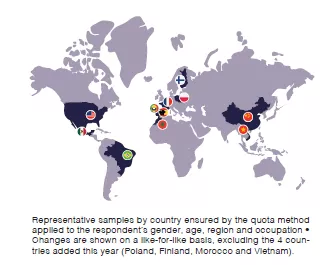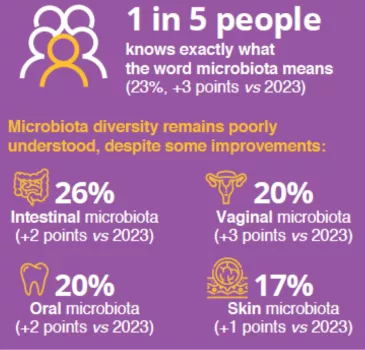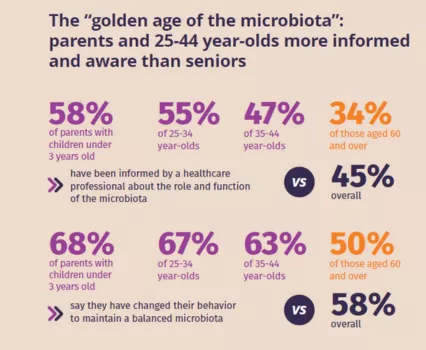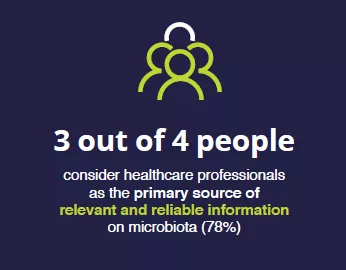International Microbiota Observatory 2nd edition
By Biocodex Microbiota Institute and IPSOS
Lay public section
Find here your dedicated section
Sources
This article is based on scientific information
Sections

About this article
Awareness of the importance of the microbiota for health is starting to grow, but there is still a long way to go Healthcare professionals have a key role to play in education and information!
For the second year running, the Biocodex Microbiota Institute has commissioned Ipsos to conduct a major international survey on the microbiota: the International Microbiota Observatory. It was conducted by Ipsos among 7,500 people in 11 countries (France, Spain, Portugal, Poland, Finland, Morocco, United States, Brazil, Mexico, China and Vietnam). In each country, the sample surveyed was representative of the country’s population aged 18 and over in terms of gender, age, occupation, and region. The survey was conducted over the Internet between January 26 and February 26, 2024. Here are the main insights.
11 COUNTRIES
7,500 RESPONDENTS

Knowledge about the microbiota and its role is progressing worldwide but it remains a part of the body that is too often misunder stood
- This year, only 1 in 5 people claim to know exactly what the term “microbiota” means (23%), but awareness of the term is on the rise (+3 points vs. 2023). Overall, 7 out of 10 people have heard of the microbiota (+7 points vs. 2023).
- Knowledge of the diversity of microbiotas remains limited but has also improved compared to last year. The gut microbiota remains the best-known microbiota: 26% know exactly what it is (+2 points vs. 2023). Next come vaginal microbiota (20%, +3 points vs. 2023), oral microbiota (20%, +2 points vs. 2023), skin microbiota (17%; +1 point vs. 2023), and urinary microbiota (16%, +2 points vs. 2023).
- The role and functions of the microbiota are also better known than last year : 78% know that their diet has an impact on the balance of their microbiota (+2 points vs. 2023).
- However, we still have a long way to go, particularly in terms of knowledge of the characteristics and composition of the microbiota. Less than 1 in 2 people know that the microbiota is not located exclusively in the gut (46%, +1 point vs. 2023), and only half of respondents are aware that the microbiota enables the gut to deliver essential health information to the brain (53%, identical to 2023).

People are beginning to change their behavior to maintain a balanced microbiota
- More than half of the population surveyed (58%) say they have already changed their behavior to better protect the balance and proper functioning of their microbiota. However, this awareness needs to be put into perspective: only 17% do it “a lot,” with 2 out of 5 saying they only do it “a little” (41%)
- The vast majority of respondents claim to have adopted appropriate behaviors, although they often admit to only doing so partially. A large majority say they eat a balanced and varied diet (84%, but only 33% do so completely), are physically active (78%, but only 35% say they do so completely), avoid smoking (76%), or limit processed foods (75%, but only 26% say they do so completely) to limit the risk of an imbalanced microbiota.
- On the other hand, certain behaviors more specifically linked to protecting the body’s microbiota have not been sufficiently adopted. 59% say they bathe or shower several times a day, a practice likely to cause dysbiosis (an imbalance in the composition of the microbiota that can lead to numerous health problems), and 42% of women practice vaginal douching, even though this is harmful to their vaginal microbiota.
A “golden age for the microbiota”? Parents and 25–44-year-olds are the most knowledgeable about the microbiota, in contrast to seniors
- Parents of children under 3 and the 25-44 age group are more aware and informed: this is the “golden age for the microbiota.”
- These populations have a greater knowledge of the microbiota: 76% of parents of children under 3, 78% of those aged 25-34, and 75% of those aged 35-44 have heard of the term “microbiota” (vs. 70% overall).
- Parents of young children (68%), those aged 25-34 (67%), and those aged 35-44 (63%) are also the most likely to say they have modified their behavior to protect the balance and proper functioning of their microbiota (vs. 58% overall).
- This is partly due to the role of healthcare professionals in raising awareness. Thus, 58% of parents of children under 3, 55% of those aged 25-34, and 47% of those aged 35-44 have received explanations from their healthcare professionals on what the microbiota is and its role and functions (vs. 45% overall).
- On the other hand, even though their age exposes them to recurring health problems, seniors are the great forgotten age group when it comes to the microbiota.
- Their knowledge of the microbiota is lower: only 61% of those aged 60 and over have ever heard of the microbiota (vs. 70% overall).
- The subject is infrequently discussed with healthcare professionals: only a third of seniors have received information from healthcare professionals on the microbiota and its role and functions (34%, vs. 45% overall).

Recognized by the world’s population as the most reliable source of information on the microbiota, healthcare professionals have a crucial role to play in encouraging their patients to adopt the right behaviors
- Healthcare professionals are the most credible source of information: more than 3 out of 4 respondents consider healthcare professionals to be the most reliable source of information on the microbiota (78%; first source mentioned).
- Compared with last year, people are more aware of the microbiota thanks to their healthcare professionals, an encouraging development. As a result, 45% have received an explanation about what the microbiota is, an indicator that is 6 points higher than in 2023.
- This awareness-raising by healthcare professionals is all the more important, as it has a major impact on patients’ knowledge and behavior. In fact, individuals who have received repeated information from a healthcare professional about the microbiota have a better understanding of it (53% know exactly what it is, vs. 23% overall). They are also more likely to have changed their behavior to maintain a balanced microbiota (95% vs. 58% overall).


